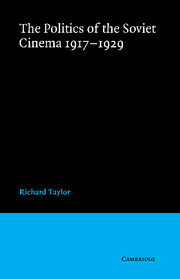Book contents
- Frontmatter
- Contents
- Preface
- Acknowledgements
- Note on transliteration
- Abbreviations
- 1 The pre-history of the Soviet cinema
- 2 The Bolsheviks, propaganda and the cinema
- 3 Revolution and Civil War
- 4 The disorganisation of organisation: the early twenties
- 5 The organisation of disorganisation: the later twenties
- 6 The Party takes control
- 7 Theory and film
- 8 Conclusions
- Notes
- Bibliography
- Index
Preface
Published online by Cambridge University Press: 07 October 2011
- Frontmatter
- Contents
- Preface
- Acknowledgements
- Note on transliteration
- Abbreviations
- 1 The pre-history of the Soviet cinema
- 2 The Bolsheviks, propaganda and the cinema
- 3 Revolution and Civil War
- 4 The disorganisation of organisation: the early twenties
- 5 The organisation of disorganisation: the later twenties
- 6 The Party takes control
- 7 Theory and film
- 8 Conclusions
- Notes
- Bibliography
- Index
Summary
Much has been written about Soviet literature and its political significance in the years immediately following the October Revolution, but little has been written about the political significance of the cinema. Jay Leyda's seminal history of the Russian and Soviet cinema and Marie Seton's biography of Eisenstein are concerned rather with the artistic development of the medium: they are not conceived as studies of its political organisation or its propaganda function. Yet the cinema is widely regarded as one of the most important media of mass communication and of political influence on public opinion in the twentieth century. Before the advent of radio and television the cinema was undoubtedly the most important such medium. This was the reason for Lenin's oft quoted (at least in Soviet sources) remark that ‘Of all the arts… for us the cinema is the most important’. It was my intention, in undertaking this study, to examine the Soviet cinema in the 1920s from the perspective of its political function in the development of the new Soviet society, to investigate the attitude of the Soviet authorities towards the cinema, and the actual uses to which the cinema was put. I have looked at conflicting theories of film and its rôle only in so far as they seemed to me to have a more general political significance. An adequate study of Soviet film theory in the 1920s would be a separate, and very worthwhile, undertaking, for it is an area that still awaits its historian.
- Type
- Chapter
- Information
- The Politics of the Soviet Cinema 1917–1929 , pp. ix - xPublisher: Cambridge University PressPrint publication year: 1979

